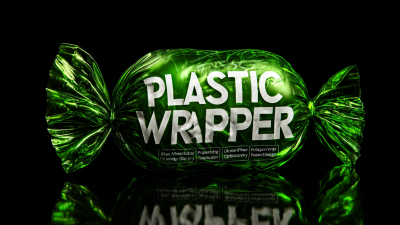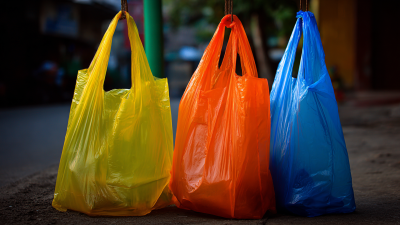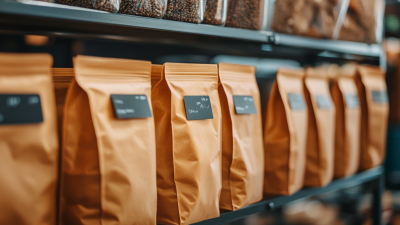- Phone:+86 15218629499
- Phone: +86 15766990063
- E-mail: Yzprinting01@163.com
The growing prevalence of plastic wrappers in our daily lives raises significant concerns regarding their environmental impact. These ubiquitous materials, often used in packaging food and products for convenience, contribute to a vast array of ecological issues, including pollution, wildlife endangerment, and greenhouse gas emissions. As plastic wrappers break down into microplastics, they infiltrate our ecosystems, posing serious threats to marine and terrestrial life alike.

Additionally, the production process of these wrappers consumes valuable resources and energy, further exacerbating environmental degradation. However, there is a growing movement towards sustainable alternatives, which aim to reduce or eliminate the detrimental effects associated with plastic wrappers. This article will explore the environmental ramifications of plastic wrappers, the importance of transitioning to sustainable options, and innovative materials that promise to protect our planet while still meeting consumer needs.
Plastic wrappers are an omnipresent aspect of our daily lives, infiltrating everything from groceries to takeout meals. According to a report by the European Commission, plastic packaging accounts for approximately 40% of total plastic consumption in the EU. This overwhelming prevalence is partially due to the convenience and cost-effectiveness of plastic materials, which provide protection and extend shelf life for numerous products. In fact, the global plastic packaging market was valued at around $350 billion in 2021, with an expected growth rate of 5.3% annually, underscoring our continued reliance on these materials.
However, the environmental repercussions of plastic wrappers are dire. The National Geographic reports that approximately 380 million tons of plastic are produced each year, with a staggering portion becoming waste. Traditional plastic wrappers take hundreds of years to decompose, contributing to landfills and marine pollution, where they endanger wildlife. As awareness of these impacts rises, sustainable alternatives such as compostable wrappers made from plant-based materials and biodegradable films are gaining traction. A study by the Biodegradable Products Institute indicates that transitioning to sustainable packaging could reduce greenhouse gas emissions by up to 30%, highlighting the urgent need for changes in our consumption habits toward more environmentally friendly options.

Plastic wrappers have become ubiquitous in modern packaging, but their environmental consequences are profound and alarming. The production and disposal of plastic wrappers contribute significantly to pollution. These materials take hundreds of years to decompose, leading to the accumulation of waste in landfills and natural environments. Many plastic wrappers end up in oceans, where they pose a severe threat to marine life, with animals ingesting or becoming entangled in the debris. This not only disrupts ecosystems but also enters the food chain, impacting human health as well.
Sustainable alternatives to plastic wrappers are emerging as vital solutions to mitigate these environmental impacts. Biodegradable materials, such as plant-based films, offer a promising replacement. These alternatives break down more quickly and reduce the overall carbon footprint associated with traditional plastic production. Additionally, reusable packaging options are gaining traction, promoting a circular economy that minimizes waste. By adopting sustainable practices and materials, consumers and manufacturers can collectively lessen the detrimental effects of plastic wrapper waste on the environment, paving the way for a more eco-friendly future.

The pervasive use of plastic wrappers has raised significant environmental concerns, prompting the need for innovative sustainable alternatives. Traditional plastic wrap, often used for food preservation, contributes to pollution and greenhouse gas emissions. In response, many companies are now exploring materials that are not only biodegradable but also effective in maintaining food freshness.
One promising alternative is beeswax wraps, which combine organic cotton with beeswax, tree resin, and jojoba oil. These wraps are reusable, compostable, and provide a natural barrier against air and moisture, making them an excellent option for keeping food fresh without the environmental toll of plastic. Additionally, plant-based films made from materials like cornstarch or seaweed offer another eco-friendly solution. These films are designed to decompose naturally, thus reducing plastic waste in landfills and oceans.
The innovation in sustainable packaging is not limited to wraps; advancements in compostable materials and reusable containers are gaining traction in the market. By shifting towards these alternatives, consumers can significantly reduce their environmental footprint while supporting a more sustainable future. Embracing these innovative solutions not only helps combat pollution but also fosters a market for greener products, encouraging further development in this essential area.
| Type of Wrapper | Material | Environmental Impact | Sustainable Alternatives |
|---|---|---|---|
| Plastic Wrap | Polyethylene | Non-biodegradable, contributes to ocean pollution | Beeswax Wrap, Silicone Covers |
| Cellophane | Cellulose | Biodegradable, but production is resource-intensive | Biodegradable Paper Wrap |
| Aluminum Foil | Aluminum | Energy-intensive to produce, recyclable | Reusable Silicone Bags |
| Plastic Bags | Polyethylene | Contributes significantly to plastic waste | Cotton Tote Bags, Reusable Mesh Produce Bags |
| Shrink Wrap | PVC/PET | Non-biodegradable, harmful chemicals in production | Compostable Shrink Film |
As consumer awareness of environmental issues grows, the shift towards eco-friendly packaging has gained significant momentum. Many individuals are now scrutinizing their purchasing decisions, considering not just the price and quality of a product, but also its environmental impact. This conscious consumer behavior is reflected in the increasing demand for sustainable alternatives to traditional plastic wrappers. Shoppers are increasingly gravitating towards packaging made from biodegradable materials, compostable films, and reusable containers, recognizing that their choices have a direct effect on the planet.
Moreover, brands are responding to this change in consumer sentiment by innovating and adopting more sustainable practices. Companies are actively seeking to reduce their carbon footprint by transitioning to environmentally friendly packaging options. This not only aligns their products with consumer values but also helps to establish brand loyalty among eco-conscious shoppers. Enhanced transparency regarding sourcing and manufacturing processes additionally empowers consumers to make informed decisions, creating a marketplace where sustainability is prioritized. The collective push toward eco-friendly packaging represents a pivotal movement toward reducing the environmental impact of plastic waste and fostering a healthier planet for future generations.
This chart represents the percentage of consumers considering the environmental impact of packaging materials, comparing traditional plastic wrappers to sustainable alternatives over a span of three years (2020-2022).
The growing concern over the environmental impact of plastic wrappers has prompted numerous policies and initiatives aimed at reducing their usage. According to a report by the World Economic Forum, as of 2021, the world produces approximately 300 million tons of plastic each year, with a significant portion ending up in landfills and oceans. Recognizing this, governments worldwide are taking action; for instance, the European Union has introduced a directive that aims to ban single-use plastics, including certain types of wrappers, by 2021. This initiative is a step toward achieving a circular economy, whereby materials are reused and recycled rather than discarded.
Moreover, many countries are encouraging businesses to adopt sustainable alternatives to plastic wrappers. The Ellen MacArthur Foundation reports that replacing traditional plastic films with biodegradable options could reduce the environmental footprint of packaging significantly. Companies like Unilever are leading the way, focusing on innovations such as compostable materials and reusable packaging systems. Such initiatives not only address pollution but also promote a shift in consumer behavior towards sustainability, proving that collaborative efforts between policymakers and industries can lead to meaningful change in the fight against plastic waste.






